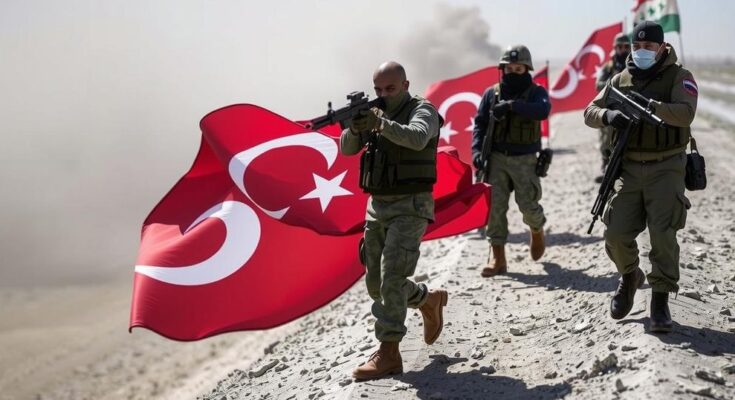Turkey’s Foreign Minister asserts that Turkey will take necessary actions to secure national interests if the new Syrian government fails to address concerns over Kurdish militias. Ties between Turkey, the YPG, and the U.S. remain complex as regional dynamics shift following the ousting of Assad.
Turkey remains resolute in its intention to ensure national security regarding concerns over Kurdish militias in Syria. Recently, Foreign Minister Hakan Fidan stated that Turkey would take “whatever it takes” should the new Syrian government fail to address Ankara’s apprehensions about Kurdish groups allied with the United States, particularly the YPG. Turkey categorizes the YPG as an extension of the PKK, a group responsible for a prolonged insurgency against the Turkish state.
Since the recent fall of Bashar al-Assad, Turkey has intensified hostilities aimed at ensuring control over regions in northern Syria, notably seizing the city of Manbij from the Kurdish-led Syrian Democratic Forces. In an interview, Fidan underscored the importance of the new Syrian administration addressing the threat in line with Syria’s territorial integrity. He insisted that the YPG must be disbanded and warned that, lacking a suitable resolution, Turkey would need to safeguard its national security proactively. On whether this would entail military action, Fidan affirmed, “whatever it takes.”
Fidan addressed the possibility of negotiations between the SDF and Turkey, advising that Kurdish factions should seek to resolve their issues with the new reality in Damascus. He articulated a compelling expectation for cooperation in addressing the potential military threats posed by the YPG/PKK. Turkey’s military actions against the SDF and its demand for the United States to cease support for Kurdish factions further illuminates the complex geopolitical situation.
Moreover, Fidan expressed discontent with the increase of US troops in Syria, suggesting that the ongoing struggle against ISIS serves merely as a pretext for sustaining backing of the SDF. He stated that the primary focus should be on maintaining custody of ISIS prisoners rather than engaging in broader military operations. Additionally, he noted that Turkey has historically collaborated with the Islamist group Hayat Tahrir al-Sham in the fight against both ISIS and al-Qaeda, demonstrating Ankara’s intricate alliances in the region. Finally, Fidan remarked that the retention of foreign military bases, including those of Russia, should be a decision made by the Syrian populace.
The ongoing conflict in Syria has exacerbated tensions between Turkey and Kurdish militias, particularly the YPG, which Turkey considers a terrorist organization. The YPG has been a crucial ally of the United States in the fight against Islamic State militants, leading to a complicated relationship involving geopolitical ramifications. Following the recent political shift in Syria with the fall of Assad, Turkey views the new governmental structure as a potential opportunity to assert its influence and address its security concerns.
In summary, Turkey’s position on the Kurdish militia issue remains steadfast as it seeks to ensure its national security amid shifting dynamics in Syria following Assad’s downfall. Foreign Minister Hakan Fidan has indicated that Turkey is prepared to take necessary actions if the new Syrian administration does not address concerns regarding the YPG. The interplay of US involvement and alliances with Kurdish militia complicates the regional security landscape further, necessitating careful diplomatic navigation going forward.
Original Source: www.euractiv.com




